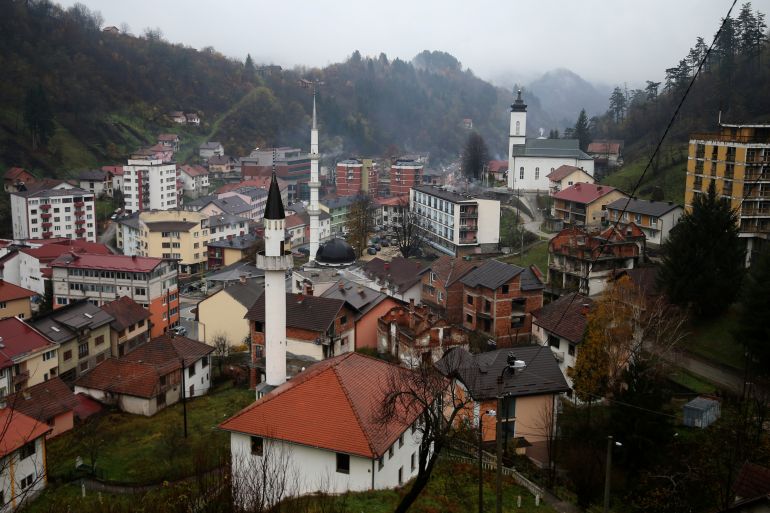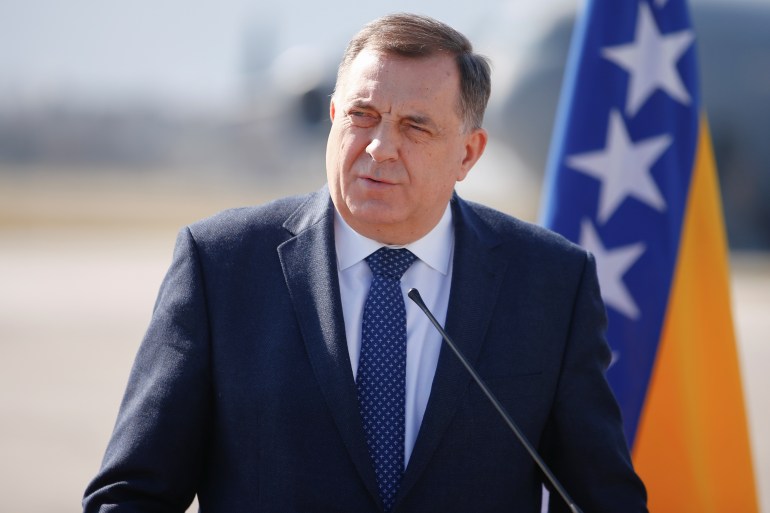Bosnians worried push to create Serb army may prompt violence
If nothing is done to curb Serb president’s push for secession of Republika Srpska entity, Bosnians fear another round of violence could ensue.

Ahmed Hrustanovic, an imam and teacher in the town of Srebrenica in Bosnia and Herzegovina fears for himself and his family as the country faces its worst political and security crisis since the war in the 1990s.
In July 1995, Serb forces killed the 35-year-old’s father, both grandfathers, four uncles and other relatives during the genocide in Srebrenica, which had been declared a United Nations “safe area”.
Keep reading
list of 4 itemsBosnia’s political crisis: What you should know, in 600 words
What is Serbia trying to achieve with its military buildup?
Why Bosnia’s ban on genocide denial was a necessity
From 1992 until 1995, Bosnia was under attack by Serb and Croat forces aiming to divide the country into a Greater Serbia and a Greater Croatia, respectively. Some 100,000 people were killed and nearly two million people fled.
The conflict ended in December 1995, with the signing of the United States-brokered Dayton Peace Agreement which established Bosnia and Herzegovina as a state composed of two entities: A Bosniak-Croat dominated Federation entity and a Serb-run Republika Srpska entity.
Milorad Dodik, Bosnia and Herzegovina’s Serb member of the tripartite presidency, which rotates every eight months between one Bosniak, one Serb and one Croat member, has been threatening for 15 years for Republika Srpska to secede.
But in the past month, he has taken significant steps towards such a move, announcing that Republika Srpska will pull out from key state institutions to achieve full autonomy within the country, in violation of the 1995 peace accords.

The crisis began in July when Valentin Inzko, then the high representative overseeing the implementation of the peace accord, banned denial of genocide and established war crimes, as well as the glorification of war criminals.
Serb representatives responded by boycotting the state’s central institutions.
Republika Srpska, along with allies China and Russia, does not recognise the Office of the High Representative and has long requested for it to shut down.
Last week, Dodik announced Republika Srpska would be moving towards forming its own Bosnian Serb army, after pulling out of Bosnia’s joint armed forces. The announcement has alarmed many Bosniaks such as Hrustanovic who fear a return to the violence of the 1990s.
“I can’t say that I’m not afraid and I can’t believe that after so many years and after surviving the genocide, you’re still afraid for yourself, your family, your life,” Hrustanovic told Al Jazeera.
“People [in Srebrenica] are scared. Today, I met one of the Mothers of Srebrenica (an activist group representing relatives of genocide victims) and she asked me, ‘My son, what’s going on? Will we have to run again?’”
It was the Bosnian Serb army along with Serb police, intelligence and security who conducted systematic violence against non-Serbs in the previous war.
The International Court of Justice in 2007 found the Bosnian Serb army to be responsible for genocide in Srebrenica, located in the Republika Srpska entity near the border with Serbia.
Hrustanovic returned to Srebrenica in 2014, two years after he and his family buried the incomplete skeletal remains of his father and two of his uncles.
A father of four, Hrustanovic said he hoped his family would not have to flee – but did not rule it out.
“The political situation was never this bad [since the war], to the point where they’re openly heading towards forming the Republika Srpska army which committed genocide,” Hrustanovic said. “What a defeat of humanity this is to allow someone again to form an army that committed a genocide.”
In Zepa, located in Republika Srpska near Srebrenica, families of Bosniak returnees were also worried.
“They are genocide survivors, mothers or seniors that live alone,” Munira Subasic, president of the Mothers of Srebrenica association who visited the community on Thursday, told Al Jazeera. “I was called to meet with them and talk, but I have no words of consolation because I, myself, cannot handle what is happening in Bosnia,” Subasic said.
“This is a difficult situation. There is a lot of talk, whispering and stories circulating, just like it was in the 1990s before the war broke out. Dodik is doing his job, he’s not going back, but the international community which betrayed us in 1995 is trying to betray us again.
“They should have done something a long time ago … They all say: ‘We’re watching, we’re observing, we’re following’ … but in reality, they’ve divided Bosnia,” Subasic continued, adding that mothers would have to use their passports to visit the graves of their loved ones buried in Republika Srpska if the entity seceded.
On Wednesday, current High Representative Christian Schmidt submitted a report to foreign missions at the United Nations, warning the peace deal is at risk of unravelling and that “the prospects of further division and conflict are very real” if Dodik created a separate Serb army.
Dodik’s actions are “tantamount to secession without proclaiming it”, he said, adding that Bosnia faces its biggest existential threat since the end of the war if the international community does not step in to curb the secessionist threats.
For their part, the European Union and the United States have issued statements calling “all political actors” and “all parties” to abandon divisive and secessionist rhetoric and respect state institutions, angering critics who insist that only one side has been violating the accords.
Yet, the commander of the EU’s peacekeeping force (EUFOR) in Bosnia Aleksander Placer said he did not see any military threat following Dodik’s moves to create a Serb army, adding that Bosnia’s joint armed forces are not anchored in the Dayton peace agreement.
“The security situation in Bosnia is stable,” he said in comments published on Wednesday in the Austrian daily Standard, baffling many Bosnians.
When asked about the threat by Bosnian Serbs to recreate their own army, the Austrian commander of @euforbih tells @derStandardat "the join army is not anchored in the Dayton peace agreement." I suppose this is to reassure jittery Bosnians?https://t.co/mDMatIM685
— Toby Vogel (@tobyvogel) November 4, 2021
Kurt Bassuener, senior associate at the Democratization Policy Council, a Berlin-based think-tank, told Al Jazeera that the crisis would worsen if the international community continued to address it only diplomatically.
Schmidt in his report made it clear that it is a security crisis, not just political, he noted.
“It requires a security response,” Bassuener said, such as reinforcing EUFOR, which is deployed to ensure a safe and secure environment but has been shrinking and below deterrent capability for more than a decade.
“There’s more than enough weaponry, and more than enough vulnerable people to allow something very bad to happen,” Bassuener said.
“The potential for miscalculation among the actors who have coercive power in Bosnia is very, very high.
“I think it is a very legitimate fear that unless this is addressed seriously with security tools in the immediate term – within days, weeks, not months – it is ever more likely that something bad will happen that not might be planned but will lead to something that will develop a dynamic of its own,” Bassuener said.
Meanwhile, in the central Bosnian town of Jajce, Samir Beharic said he was feeling nervous about the future for the first time in his life.
The 30-year-old said he was disappointed with the international community and did not expect “incompetent foreign diplomats” to ensure peace as their “quick-fix solutions” do not work.
Recently, he said, his mother had asked him if they would have to flee Jajce again – just as they had in 1992 after the Army of Republika Srpska seized the city.
“She said she’d rather die than live through a war again and she’s not the only one,” he said.